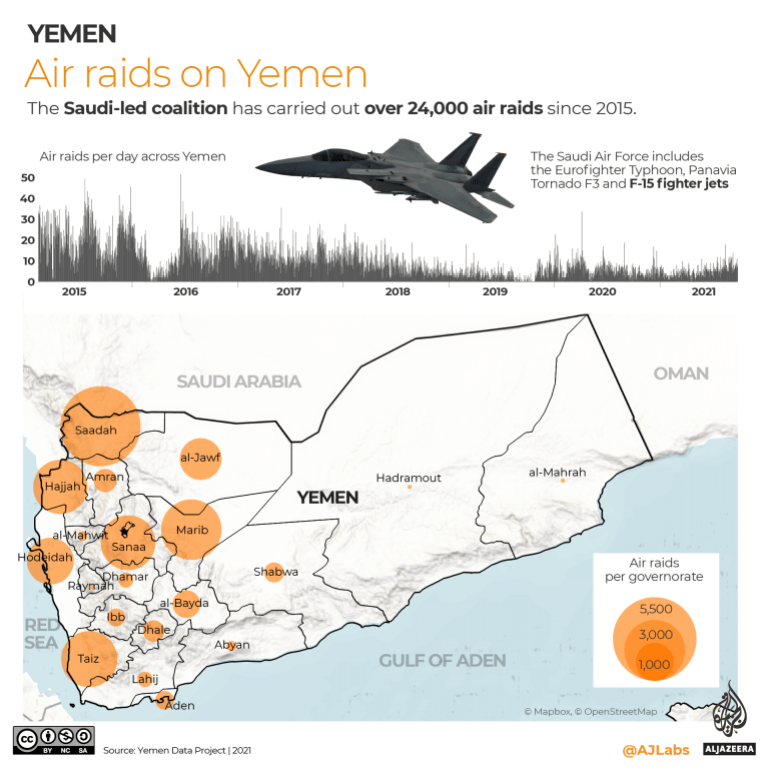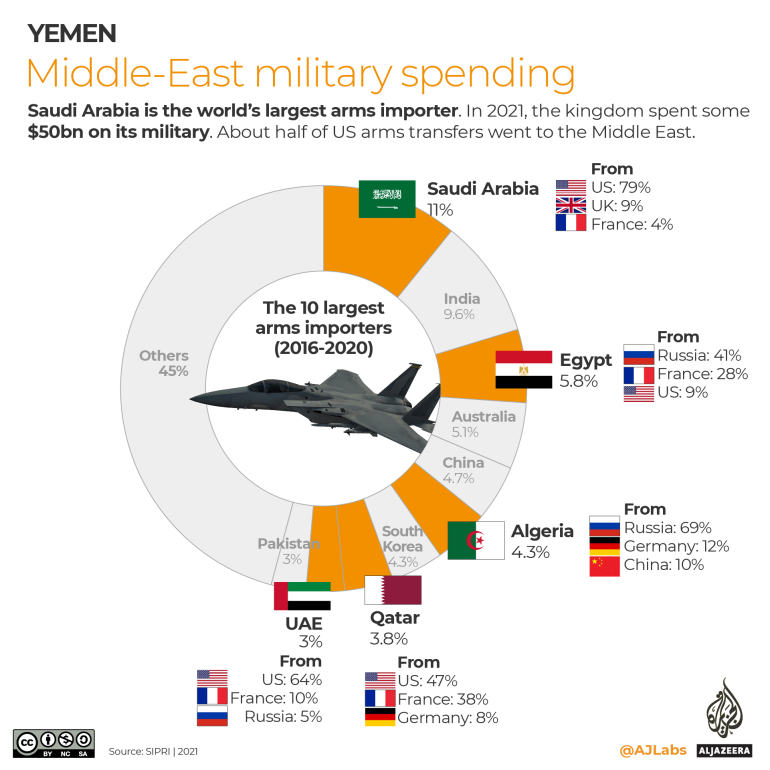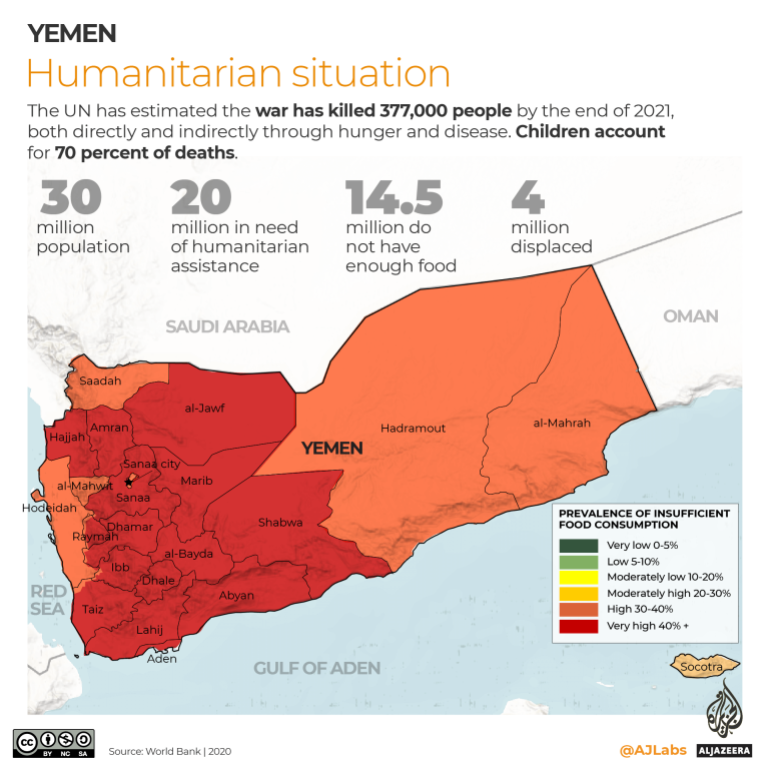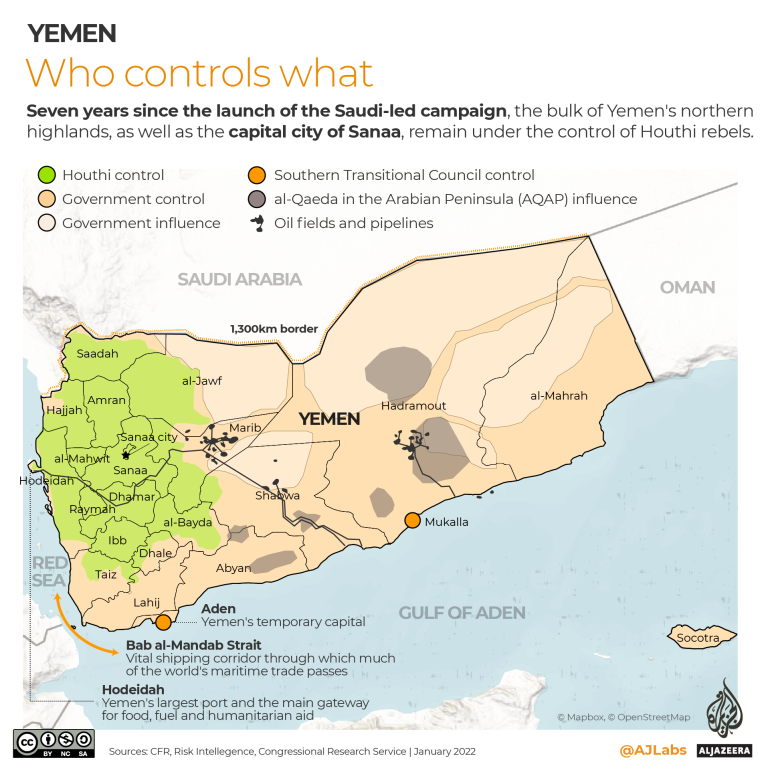A FRAGILE TRUCE IN YEMEN
As lawmakers move to end US complicity in the Saudi-led war, warring parties take a stab at peace.
At the eleventh hour just last week, parties to Yemen’s eight-year war extended their two-month truce, which is a positive development. While some have said the reasoning is “unclear,” a recent introduction of a War Powers Resolution by Congress can easily be viewed as a critical factor in the extension. To make this peace truly permanent, Congress must pass the resolution and end US support for Saudi Arabia’s brutal war.
Yet, as Congress is considering finally using its leverage, President Joe Biden appears adamant about abandoning his. Biden had promised to make Saudi Arabia a “pariah” and had released the intelligence that implicated MBS in the brutal killing of Washington Post journalist Jamal Khashoggi. But now, for the sake of oil price concerns, Biden is breaking his rule of not dealing directly with Crown Prince Mohammed bin Salman (referred to as MBS). Instead, he plans on traveling to the region to meet directly with MBS (albeit now delayed) and formalize a US security commitment with the Saudis and other Arab partners.
US ACTIONS ARE CRUCIAL IN INFLUENCING PEACE NEGOTIATIONS FOR ENDING SAUDI ARABIA’S BRUTAL WAR ON YEMEN.
Biden’s shift is troubling and could also have drastic implications for US policy and Yemen. For example, if US pressure to end the war evaporates, the Saudis, Emiratis, and their proxies will likely push to escalate fighting once the extended truce ends in early August 2022. The Houthis will respond in kind, regardless of the consequences for civilians, even though over 400,000 of them have been killed due to the war.
However, if the War Powers Resolution passes, it would effectively ground the Saudi Royal Air Force, significantly limiting the Saudis’ capacity to keep fighting. MBS is eager to avoid the humiliation of being unable to operate his air force, and this prospect represents a key factor in his apparent decision to encourage his Yemeni partners to renew the ceasefire.
A PRACTICE RUN
The two-month truce was relatively successful: The Saudis halted airstrikes and allowed in 12 fuel ships, plus three flights from Sana’a airport in Yemen to Jordan, while the Houthis ceased transborder attacks on Saudi Arabia and the United Arab Emirates. Humanitarian groups, such as the World Food Program, have also been able to access populations previously isolated by fighting. With news of the truce’s extension, hopes may grow that Yemen’s eight-year war could finally end.
But that is only likely if the United States maintains pressure on the Saudis. The warring parties have profited from the break-in hostilities to consolidate their military positions. If the fighting resumes, it’s expected to be even worse than the escalations in January 2022 — already one of the bloodiest months in the entire war. In that month, Saudi Arabia targeted a detention center and vital communications infrastructure, killing at least 90 civilians, wounding 200 more, and triggering a nationwide internet blackout.
The forces commanded by the newly appointed Presidential Leadership Council reflect unprecedented unity among the anti-Houthi camp, and the Council, as well as their Saudi and Emirati backers, are likely itching to test their new strength. In addition, the Houthis appear poised to redouble their efforts to take the strategic city of Marib, as reports from Marib indicate that Houthi offensives continued despite the truce.
During negotiations for a cessation of hostilities over the port city of Hodeidah in 2018, US actions were crucial in influencing what happens in Yemen. Moreover, the near-simultaneous introduction of a new War Powers Resolution and the renewal of the truce demonstrate that US influence remains a crucial factor. This new Yemen War Powers Resolution invokes Congress’s constitutional war powers under the War Powers Act of 1973 to end unauthorized US military participation in the Saudi-led war in Yemen. If passed, the resolution would prohibit the US military from providing intelligence sharing, logistical support, maintenance, and spare parts to Saudi warplanes conducting offensive operations against the Houthis in Yemen.
Now it is time to make that US influence a permanent factor.
FINALLY TAKING A STAND
Members of the House and Senate must reassert their constitutional war authority and finally end US military support for a war that has helped kill nearly half a million civilians and driven millions more to the edge of famine. By doing so, they will hasten Saudi Arabia’s understanding that there is no military solution in Yemen and that the US military will no longer remain complicit in Yemen’s misery. It will also send a message to the White House that it must keep its promise to end the blind support for a regime intent on cracking down on dissidents at home and destroying Yemen.
While the United States can’t unilaterally bring about peace, it must use its leverage to persuade Saudi Arabia and its proxies to stay at the negotiating table to extend this truce and finally, end the Yemen war. Congress has an opportunity to do just that.
Hassan El-Tayyab is the Legislative Director for Middle East Policy at the Friends Committee on National Legislation.
Annelle Sheline is a Middle East Research Fellow at the Quincy Institute.
The mobilization for Yemen is a powerful model for today’s peace movement
Aswat Ensemble
https://www.facebook.com/aswat.ensemble/videos/544335937409458
Yemen Can't Wait Webinar 4/21/2022
https://www.youtube.com/watch?v=RGyjktSlTlY
National Coalition Demands End to Military Support of War on Yemen
https://www.fcnl.org/updates/2022-04/national-coalition-demands-end-military-support-war-yemen
When the Music Stops: Yemen, Art and War
https://www.youtube.com/watch?v=5O5OtjAyslc
This January, [Saudi] jets killed over 90 people in the bombing of a migrant detention centre. It was one of the worst atrocities of the entire Yemen war, which has been marked by countless war crimes and civilian massacres – like we are tragically now seeing in Ukraine.
Amnesty International says a missile fragment found in the detention centre wreckage showed the weapon responsible was made by Raytheon, a US company with factories in Britain. Their equipment has been repeatedly linked to atrocities in Yemen, including the bombing of a wedding.
https://every75seconds.org/?fbclid=IwAR3R0ESfswuCgYsmm0Kfb2mc47_WBqBfER4xwyq34nhyGJQJt7Yb3AMnZo4
From Friends Committee on National Legislation-
Saudi Arabia’s War and Blockade on Yemen
https://www.fcnl.org/issues/middle-east-iran/yemen
https://fcnl.quorum.us/campaign/37146/?utm_source=fcnlaction
Since 2015, Saudi Arabia, the United Arab Emirates, and other Gulf states, with the support of the United States, have been conducting a military campaign in Yemen aimed at ousting the Houthi faction.
Indiscriminate bombing of civilian targets, including hospitals, schools, and water treatment plants, as well as the blockading of Yemeni ports—committed largely with U.S. weapons and logistical support—have resulted in what the UN has described as the world’s worst humanitarian crisis with millions of Yemenis pushed to the edge of famine.
The ongoing Saudi blockade and thousands of gruesome air strikes have left the country’s population vulnerable and its vital infrastructures in ruin. The independent Yemeni organization Mwatana for Human Rights reported that 35 coalition air raids on 32 health facilities occurred between 2015 and 2018. Despite Congress passing legislation to end U.S. military support and block arms sales to Saudi Arabia, the United States continues to provide intelligence sharing and maintenance support for Saudi-led coalition warplanes and billions of dollars in weapons sales.
Congress must pass legislation to end military support and weapons sales, restore humanitarian aid funding, and promote robust diplomacy to bring the war to an end.
The situation in Yemen has grown increasingly dire with the spread of COVID-19. Yemen is one of the most vulnerable countries to the coronavirus, given that nearly 80 percent of Yemenis are considered immunosuppressed. Yemenis who do contract the virus have limited access to the country’s health care facilities, since 50 percent have been destroyed or shut down.
The situation has been compounded by a 50% cut in aid to most of the country by the World Food Program, the reduction or closing of three quarters of all major UN aid programs, and a rollback of World Health Organization programming. As Lise Grande, the UN humanitarian coordinator for Yemen, has previously said, “Yemen needs support now—literally, right now. There are shortages of absolutely everything that’s needed to treat the people who are likely to become ill.”
FCNL’s work in Yemen is far from over, and we continue to seek federal policies and practices that avoid violence and embrace peace. Congress must pass legislation to end military support and weapons sales, endorse diplomacy and restore humanitarian aid funding, and use robust diplomacy to pressure the Saudi-led coalition into bringing the war to an end.
Hassan El-Tayyab
https://www.fcnl.org/people/hassan-el-tayyab
The People of Yemen Suffer Atrocities, Too
By Kathy Kelly, World BEYOND War, March 21, 2022
The United Nations’ goal was to raise more than $4.2 billion for the people of war-torn Yemen by March 15. But when that deadline rolled around, just $1.3 billion had come in.
“I am deeply disappointed,” said Jan Egeland, the secretary general of the Norwegian Refugee Council. “The people of Yemen need the same level of support and solidarity that we’ve seen for the people of Ukraine. The crisis in Europe will dramatically impact Yemenis’ access to food and fuel, making an already dire situation even worse.”
With Yemen importing more than 35% of its wheat from Russia and Ukraine, disruption to wheat supplies will cause soaring increases in the price of food.
“Since the onset of the Ukraine conflict, we have seen the prices of food skyrocket by more than 150 percent,” said Basheer Al Selwi, a spokesperson for the International Commission of the Red Cross in Yemen. “Millions of Yemeni families don’t know how to get their next meal.”
The ghastly blockade and bombardment of Yemen, led by Saudi Arabia and the United Arab Emirates, is now entering its eighth year. The United Nations estimated last fall that the Yemen death toll would top 377,000 people by the end of 2021.
The United States continues to supply spare parts for Saudi/UAE coalition war planes, along with maintenance and a steady flow of armaments. Without this support, the Saudis couldn’t continue their murderous aerial attacks.
Yet tragically, instead of condemning atrocities committed by the Saudi/UAE invasion, bombing and blockade of Yemen, the United States is cozying up to the leaders of these countries. As sanctions against Russia disrupt global oil sales, the United States is entering talks to become increasingly reliant on Saudi and UAE oil production. And Saudi Arabia and the UAE don’t want to increase their oil production without a U.S. agreement to help them increase their attacks against Yemen.
Human rights groups have decried the Saudi/UAE-led coalition for bombing roadways, fisheries, sewage and sanitation facilities, weddings, funerals and even a children’s school bus. In a recent attack, the Saudis killed sixty African migrants held in a detention center in Saada.
The Saudi blockade of Yemen has choked off essential imports needed for daily life, forcing the Yemeni people to depend on relief groups for survival.
There is another way. U.S. Reps. Pramila Jayapal of Washington and Peter De Fazio of Oregon, both Democrats, are now seeking cosponsors for the Yemen War Powers Resolution. It demands that Congress cut military support for the Saudi/UAE-led coalition’s war against Yemen.
On March 12, Saudi Arabia executed 81 people, including seven Yemenis – two of them prisoners of war and five of them accused of criticizing the Saudi war against Yemen.
Just two days after the mass execution, the Gulf Corporation Council, including many of the coalition partners attacking Yemen, announced Saudi willingness to host peace talks in their own capital city of Riyadh, requiring Yemen’s Ansar Allah leaders (informally known as Houthis) to risk execution by Saudi Arabia in order to discuss the war.
The Saudis have long insisted on a deeply flawed U.N. resolution which calls on the Houthi fighters to disarm but never even mentions the U.S. backed Saudi/UAE coalition as being among the warring parties. The Houthis say they will come to the negotiating table but cannot rely on the Saudis as mediators. This seems reasonable, given Saudi Arabia’s vengeful treatment of Yemenis.
The people of the United States have the right to insist that U.S. foreign policy be predicated on respect for human rights, equitable sharing of resources and an earnest commitment to end all wars. We should urge Congress to use the leverage it has for preventing continued aerial bombardment of Yemen and sponsor Jayapal’s and De Fazio’s forthcoming resolution.
We can also summon the humility and courage to acknowledge U.S. attacks against Yemeni civilians, make reparations and repair the dreadful systems undergirding our unbridled militarism.
Kathy Kelly, a peace activist and author, co-coordinates the Ban Killer Drones campaign and is board president of World BEYOND War. A shortened version of this article produced for Progressive Perspectives, which is run by The Progressive magazine
National Day of Action to End US Support for the War in Yemen
Tuesday, March 1st - Friends Committee on National Legislation Milwaukee Advocacy Team meeting with WI Rep. Gwen Moore's Aide, Chris Goldsen.
From Friends Committee on National Legislation-
End US Complicity in Saudi Arabia’s War and Blockade on Yemen

- 14,630 children have died so far in 2022, according to the worst-case estimates. In 2022, worst-case estimates are that 400,000 Yemeni children may die — one every 75 seconds or more than 1,100 per day (World Food Program and United Nations
- Since the beginning of the Yemeni Civil War, at least 230,000 civilians have died — some 131,000 from indirect causes such as lack of food (UN), 85,000 children may have died between April 2015 and October 2018 (Save the Children)
- As the situation deteriorates, 16 million Yemenis are on the brink of starvation with 2.3 million children under 5 suffering acute malnutrition; a spike in food prices and a further collapse of Yemen's currency in summer 2021 is driving even more children to hunger (UN, World Food Program, and Save the Children)
-
Yemen is facing one of the world’s worst humanitarian crises as the war there enters its eighth year.
The UN estimates the war had killed 377,000 people as of the end of 2021, both directly and indirectly through hunger and disease – 70 percent of those deaths are children.
The United States can stop this — by ending the Saudi blockade of Yemen!
Sponsored by End the Wars Coalition, Peace Action WI, Women’s Int’l League for Peace & Freedom-MKE, Friends Committee on National Legislation Milwaukee, Progressive Democrats of WI, Veterans for Peace Chapter 102, Milwaukee Public Enterprise Committee, United Nation Association of Milwaukee
 (Al Jazeera)
(Al Jazeera)





Showing 1 reaction
Sign in with